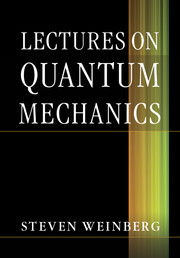Book contents
- Frontmatter
- Contents
- PREFACE
- NOTATION
- 1 HISTORICAL INTRODUCTION
- 2 PARTICLE STATES IN A CENTRAL POTENTIAL
- 3 GENERAL PRINCIPLES OF QUANTUM MECHANICS
- 4 SPIN ET CETERA
- 5 APPROXIMATIONS FOR ENERGY EIGENVALUES
- 6 APPROXIMATIONS FOR TIME-DEPENDENT PROBLEMS
- 7 POTENTIAL SCATTERING
- 8 GENERAL SCATTERING THEORY
- 9 THE CANONICAL FORMALISM
- 10 CHARGED PARTICLES IN ELECTROMAGNETIC FIELDS
- 11 THE QUANTUM THEORY OF RADIATION
- 12 ENTANGLEMENT
- AUTHOR INDEX
- SUBJECT INDEX
- References
1 - HISTORICAL INTRODUCTION
- Frontmatter
- Contents
- PREFACE
- NOTATION
- 1 HISTORICAL INTRODUCTION
- 2 PARTICLE STATES IN A CENTRAL POTENTIAL
- 3 GENERAL PRINCIPLES OF QUANTUM MECHANICS
- 4 SPIN ET CETERA
- 5 APPROXIMATIONS FOR ENERGY EIGENVALUES
- 6 APPROXIMATIONS FOR TIME-DEPENDENT PROBLEMS
- 7 POTENTIAL SCATTERING
- 8 GENERAL SCATTERING THEORY
- 9 THE CANONICAL FORMALISM
- 10 CHARGED PARTICLES IN ELECTROMAGNETIC FIELDS
- 11 THE QUANTUM THEORY OF RADIATION
- 12 ENTANGLEMENT
- AUTHOR INDEX
- SUBJECT INDEX
- References
Summary
The principles of quantum mechanics are so contrary to ordinary intuition that they can best be motivated by taking a look at their prehistory. In this chapter we will consider the problems confronted by physicists in the first years of the twentieth century that ultimately led to modern quantum mechanics.
Photons
Physicists in the last decades of the nineteenth century were greatly concerned to understand the nature of black-body radiation — radiation that had come into thermal equilibrium with matter at a given temperature T. The energy ρ(ν, T)dν per volume at frequencies between ν and ν + dν had been measured, chiefly at the University of Berlin, and it was known on thermodynamic grounds that ρ(ν, T) is a universal function of frequency and temperature, but how could one calculate this function?
A simple calculation was given in 1900 by John William Strutt (1842–1919), more usually known as Lord Rayleigh. It was familiar that one can think of the radiation field in a box as a Fourier sum over normal modes. For instance, for a cubical box of width L, whatever boundary condition is satisfied on one face of the box must be satisfied on the opposite face, so the phase of the radiation field must change by an integer multiple of 2π in a distance L.
Information
- Type
- Chapter
- Information
- Lectures on Quantum Mechanics , pp. 1 - 28Publisher: Cambridge University PressPrint publication year: 2012
